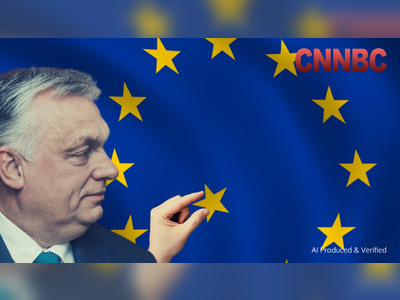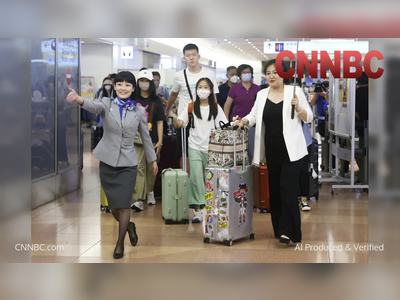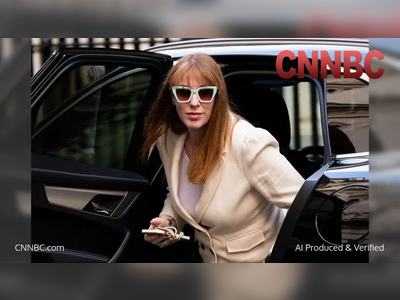More Than 150,000 Followers for a Fictional Character: The New Influencers Are AI Creations
Artificial intelligence is enabling the rise of virtual influencers, with some amassing over 150,000 followers. While brands enjoy cheaper, automated campaigns with full control, concerns grow among human creators about job displacement, deceptive marketing, and the mental health impact of unrealistic beauty standards.
AI technology is generating thousands of virtual avatars, disrupting the creator economy.
While it simplifies the workflow for influencers—allowing them to post content even while asleep—it also raises concerns that human creators may soon be replaced.
For now, users still seem to prefer human influencers.
A viral eight-second TikTok video showed an American student named Tinsley tearfully sharing that she hadn’t been accepted into her desired sorority.
“Sweetheart, surely there's a sorority that wants you, keep trying!!!” one user commented on the clip, which gained nearly 150,000 views.
Another wrote, “Don’t give up.” But the encouragement was unnecessary.
Tinsley, who gained several hundred followers in just days, was actually a “100% AI influencer,” according to her creator, Olivia Moore of Silicon Valley venture capital group a16z.
Moore referred to the project as an experiment, spending under ten minutes a day for a week in August building the fake profile using just three existing AI tools.
“This may be the future of branding, marketing, and even entertainment,” she wrote in a post on X.
AI-powered tools capable of producing cinematic-quality content are helping launch thousands of digital avatars into the creator economy, which was valued at $250 billion in 2023.
These “AI influencers” may be entirely new characters or replicas of existing ones.
The technology is now so convincing that one influencer, Milla Zalu, gained over 150,000 followers after appearing in social media videos watching Wimbledon matches—only to later be revealed as AI-generated.
Supporters say such tools benefit human influencers by automating tasks like translating content into multiple languages, responding to followers, or uploading animated versions of themselves to attract brand deals—even while asleep.
For brands, the appeal lies in instant, low-cost marketing and full control over the avatar’s appearance and messaging.
Alexandru Vica, communications director at the startup Synthesia, called it a “game-changer” that allows even small brands without large budgets to run “polished, high-quality campaigns.”
Still, this shift has sparked concern among some human influencers, particularly those unwilling to use AI in their creative process, who fear being replaced.
A survey of 500 marketers conducted by Influencer Marketing Hub and published last year found that nearly 60% had already used AI influencers in campaigns, and 15.5% planned to.
Most respondents cited control over the influencer’s behavior as a key factor in the decision.
“This is dangerous for artists,” said content creator and plus-size model Gabriella Halikas.
“It’s dangerous for anyone creative involved in a shoot—whether a hairstylist, makeup artist, stylist, model, photographer, video editor, or producers.” According to her, the situation is getting out of control.
“We’re going to see more people raising awareness.
I think we’re just getting started.”
According to industry executives, AI-generated content and fully AI-managed accounts are now central to the strategy of Silicon Valley social media platforms.
In October, Meta CEO Mark Zuckerberg predicted that artificial intelligence would create “an entirely new category of content,” calling it one of the most important trends and use cases.
Meta’s AI studio enables creators to “build extensions of themselves through AI” by using past post data to “mimic their tone and expressions,” with mass personalization expected to follow.
However, Adrian Lahans, former head of content strategy and operations at TikTok, believes the biggest winners will be a new breed of influencers she calls “AI artists”—individuals with advanced technical skills and knowledge of video AI models developed by companies like Google and OpenAI, who create characters with compelling narratives.
Alex Mashrabov, founder of Higgsfield AI, said some creators are using his video platform to run “AI talent agencies,” directing users to lists of AI influencers.
This allows them to profit from partnerships without paying for physical shoots or travel.
“The next media empire won’t be built in Hollywood or Silicon Valley, but by a guy in his twenties with a small group of AI-based characters,” said Mashrabov, formerly head of AI at Snap.
With the right tools, he said, creators will be able to “outmaneuver studios, beat agencies, and surpass Hollywood.”
A new market is already emerging to support the AI creator economy, including studios specializing in virtual character development and narrative management, and advertising groups connecting brands with virtual influencers.
Lil Miquela was one of the first virtual influencers, created by Los Angeles-based company Brud, which charges up to hundreds of thousands of dollars for brand partnerships with companies like Burberry, Prada, and Givenchy.
Another company, Fameflow AI, which allows brands to use celebrity avatars for marketing purposes, reported having signed over 100 celebrities so far.
Some are bypassing human influencers entirely.
Dylan Fournier, co-founder of Arcads, said paying fully AI-generated actors to produce short ads costs “ten euros compared to 300 euros” with real creators.
Still, many major advertising agencies remain cautious, especially regarding the ethical implications and how to disclose the use of such technology.
“It’s still unclear how consumers will respond,” said a senior advertising executive.
“There have been a few high-profile cases where the use of AI was made clear, but if it stops being a novelty and becomes just another influencer campaign, I think there’ll be reservations due to concerns over deceiving people.
Even if everything is disclosed, it remains a problematic space.”
One common claim is that AI cannot replace human influencers because it's harder for audiences to connect with virtual characters—a notion currently backed by data.
A report by Twicsy analyzing earnings, revenue streams, and audience engagement for over 11,500 human and AI-based influencers found that sponsored posts from human influencers achieved 2.7 times more user engagement than those by AI influencers.
The report also noted that human influencers earn an average of $78,777 per post, compared to $1,694 for virtual influencers.
“AI can’t experience things.
It can’t be a tired parent, have skin issues, or taste food,” said Jago Sherman, head of strategy at GOAT, the influencer arm of advertising giant WPP. He cited data showing that 65% of adult audiences felt uncomfortable with AI-generated advertisements.
He predicts a rise in “influencer fraud,” where creators are hired to produce human-made content but cut corners using AI.
“If we’re paying for human content but get something not made by a human, that’s fool’s gold.”
Halikas warned that AI influencers set unrealistic beauty standards that could negatively impact users’ mental health.
“They’re not real, in the most literal sense of the word, and I think that’s deeply troubling in terms of their effect on young people and women.”
The shift is also sparking concern that platforms like Meta could be flooded with “AI junk”—low-quality, bizarre, or misleading content made with AI, intended mainly to boost engagement for profit.
Canadian podcast host Shira Lazar described this kind of content as the internet’s equivalent of “fast food,” which will push more users to examine the origins of what they consume online.
“The true tastemakers will experience a renaissance,” added Neil Waller, co-founder of the agency Whalar.
While it simplifies the workflow for influencers—allowing them to post content even while asleep—it also raises concerns that human creators may soon be replaced.
For now, users still seem to prefer human influencers.
A viral eight-second TikTok video showed an American student named Tinsley tearfully sharing that she hadn’t been accepted into her desired sorority.
“Sweetheart, surely there's a sorority that wants you, keep trying!!!” one user commented on the clip, which gained nearly 150,000 views.
Another wrote, “Don’t give up.” But the encouragement was unnecessary.
Tinsley, who gained several hundred followers in just days, was actually a “100% AI influencer,” according to her creator, Olivia Moore of Silicon Valley venture capital group a16z.
Moore referred to the project as an experiment, spending under ten minutes a day for a week in August building the fake profile using just three existing AI tools.
“This may be the future of branding, marketing, and even entertainment,” she wrote in a post on X.
AI-powered tools capable of producing cinematic-quality content are helping launch thousands of digital avatars into the creator economy, which was valued at $250 billion in 2023.
These “AI influencers” may be entirely new characters or replicas of existing ones.
The technology is now so convincing that one influencer, Milla Zalu, gained over 150,000 followers after appearing in social media videos watching Wimbledon matches—only to later be revealed as AI-generated.
Supporters say such tools benefit human influencers by automating tasks like translating content into multiple languages, responding to followers, or uploading animated versions of themselves to attract brand deals—even while asleep.
For brands, the appeal lies in instant, low-cost marketing and full control over the avatar’s appearance and messaging.
Alexandru Vica, communications director at the startup Synthesia, called it a “game-changer” that allows even small brands without large budgets to run “polished, high-quality campaigns.”
Still, this shift has sparked concern among some human influencers, particularly those unwilling to use AI in their creative process, who fear being replaced.
A survey of 500 marketers conducted by Influencer Marketing Hub and published last year found that nearly 60% had already used AI influencers in campaigns, and 15.5% planned to.
Most respondents cited control over the influencer’s behavior as a key factor in the decision.
“This is dangerous for artists,” said content creator and plus-size model Gabriella Halikas.
“It’s dangerous for anyone creative involved in a shoot—whether a hairstylist, makeup artist, stylist, model, photographer, video editor, or producers.” According to her, the situation is getting out of control.
“We’re going to see more people raising awareness.
I think we’re just getting started.”
According to industry executives, AI-generated content and fully AI-managed accounts are now central to the strategy of Silicon Valley social media platforms.
In October, Meta CEO Mark Zuckerberg predicted that artificial intelligence would create “an entirely new category of content,” calling it one of the most important trends and use cases.
Meta’s AI studio enables creators to “build extensions of themselves through AI” by using past post data to “mimic their tone and expressions,” with mass personalization expected to follow.
However, Adrian Lahans, former head of content strategy and operations at TikTok, believes the biggest winners will be a new breed of influencers she calls “AI artists”—individuals with advanced technical skills and knowledge of video AI models developed by companies like Google and OpenAI, who create characters with compelling narratives.
Alex Mashrabov, founder of Higgsfield AI, said some creators are using his video platform to run “AI talent agencies,” directing users to lists of AI influencers.
This allows them to profit from partnerships without paying for physical shoots or travel.
“The next media empire won’t be built in Hollywood or Silicon Valley, but by a guy in his twenties with a small group of AI-based characters,” said Mashrabov, formerly head of AI at Snap.
With the right tools, he said, creators will be able to “outmaneuver studios, beat agencies, and surpass Hollywood.”
A new market is already emerging to support the AI creator economy, including studios specializing in virtual character development and narrative management, and advertising groups connecting brands with virtual influencers.
Lil Miquela was one of the first virtual influencers, created by Los Angeles-based company Brud, which charges up to hundreds of thousands of dollars for brand partnerships with companies like Burberry, Prada, and Givenchy.
Another company, Fameflow AI, which allows brands to use celebrity avatars for marketing purposes, reported having signed over 100 celebrities so far.
Some are bypassing human influencers entirely.
Dylan Fournier, co-founder of Arcads, said paying fully AI-generated actors to produce short ads costs “ten euros compared to 300 euros” with real creators.
Still, many major advertising agencies remain cautious, especially regarding the ethical implications and how to disclose the use of such technology.
“It’s still unclear how consumers will respond,” said a senior advertising executive.
“There have been a few high-profile cases where the use of AI was made clear, but if it stops being a novelty and becomes just another influencer campaign, I think there’ll be reservations due to concerns over deceiving people.
Even if everything is disclosed, it remains a problematic space.”
One common claim is that AI cannot replace human influencers because it's harder for audiences to connect with virtual characters—a notion currently backed by data.
A report by Twicsy analyzing earnings, revenue streams, and audience engagement for over 11,500 human and AI-based influencers found that sponsored posts from human influencers achieved 2.7 times more user engagement than those by AI influencers.
The report also noted that human influencers earn an average of $78,777 per post, compared to $1,694 for virtual influencers.
“AI can’t experience things.
It can’t be a tired parent, have skin issues, or taste food,” said Jago Sherman, head of strategy at GOAT, the influencer arm of advertising giant WPP. He cited data showing that 65% of adult audiences felt uncomfortable with AI-generated advertisements.
He predicts a rise in “influencer fraud,” where creators are hired to produce human-made content but cut corners using AI.
“If we’re paying for human content but get something not made by a human, that’s fool’s gold.”
Halikas warned that AI influencers set unrealistic beauty standards that could negatively impact users’ mental health.
“They’re not real, in the most literal sense of the word, and I think that’s deeply troubling in terms of their effect on young people and women.”
The shift is also sparking concern that platforms like Meta could be flooded with “AI junk”—low-quality, bizarre, or misleading content made with AI, intended mainly to boost engagement for profit.
Canadian podcast host Shira Lazar described this kind of content as the internet’s equivalent of “fast food,” which will push more users to examine the origins of what they consume online.
“The true tastemakers will experience a renaissance,” added Neil Waller, co-founder of the agency Whalar.












